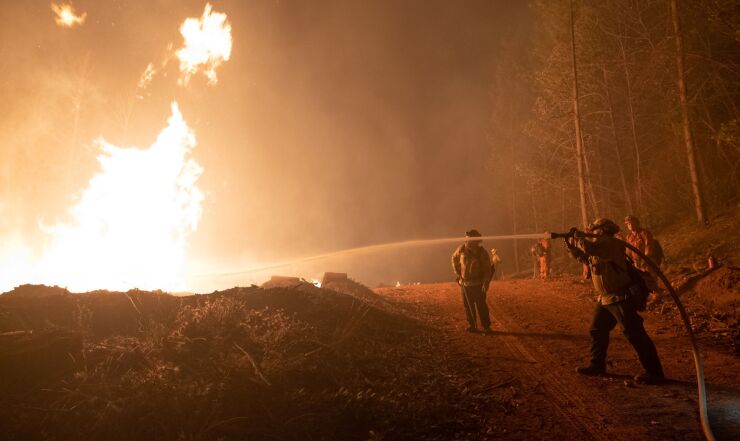
Dozens of deadly wildfires raging across California, Oregon and Washington could also pose a risk to state and local budgets already struggling under the weight of the pandemic.
Oregon Gov. Kate Brown, a Democrat, said during a Monday press conference that she expects the state's legislature will need to hold a third special session to deal with budget items, but it's not likely to occur before the presidential election.
Brown and other governors have pleaded with the federal government to provide more aid to states and their localities to deal with costs and the hit to revenues from the COVID-19 pandemic.
The rating agencies have in most cases viewed natural disasters, including wildfires, as not being a credit risk to state and local budgets, because of support from the state and federal government. Of the California blazes, Moody’s Investors Service said in a recent
More than 40,000 Oregonians have been evacuated and 500,000 were under an evacuation notice last weekend in a state where more than 1 million acres have burned, 10 people have died and 22 have been reported missing, said Doug Graf, Chief of Fire Protection for the Oregon Department of Forestry. The acreage burned is about twice the annual average for the past decade.
Brown and California Gov. Gavin Newsom, a Democrat, have vowed to ramp up efforts to combat climate change, which both have cited in recent public remarks for creating conditions that have ushered in an era of devastating wildfires on the West Coast over the past several years.
“There is no doubt that this is a wake-up call that we need to address climate change,” Brown said. "State, localities and the federal government need to take action on this issue."
Brown created a governor’s council on wildfire response in November in response to the havoc wreaked by wildfires in 2018 when 1,180 fires burned 846,000 acres at a cost of $514 million to the state, according to the Northwest Interagency Coordination Center.
Senate Bill 1536, the bill that would have implemented the recommendations from the council, didn’t pass the Legislature after Republicans

“It would have provided more boots on the ground, more resources for firefighters and would have provided the Oregon Office of Emergency Management with more resources for evacuation plans,” Brown said.
“We have to be creative in how we deploy folks to fight fires given what we are seeing,” Brown said. “These fires are more fierce and hotter. In the last couple of years, they have moved more rapidly.”
Brown provided notice Monday
Combined, the vetoes will preserve over $65 million, improving the state’s ending balance to total $164.3 million in general funds and $16.7 million in lottery funds. The governor also requested that legislators reserve at least $150 million in the state’s emergency fund for upcoming requests relating to the fires.
On Friday, Newsom vowed to accelerate California’s efforts to tackle climate change calling the wildfires and resulting air quality problems “a climate damn emergency.”
He was more sanguine during President Donald Trump's visit to Sacramento Monday,
Most of California's forests are owned by the federal government.
In February, the National Association of State Foresters said
“Given the boundary-less nature of forest pests, disease, and wildfire, additional investments in state and private forests are needed in order for all forests to be healthy, resilient, and productive across all boundaries,” said Greg Josten, NASF president and South Dakota state forester in a release.
California wildfires have already killed 19 people this year and burned more than 3.1 million acres, an area bigger than Connecticut, according to the California Department of Forestry and Fire Protection. That acreage is 26 times more than the amount that burned by this time last year and California’s most destructive wildfires have historically flared up in the fall.
Newsom called the role of forest management in failing to lessen the impact of wildfires “one point, but not the point," during a Friday press conference.
California has experienced record setting temperatures in August and September, and fires that have burned 147 million trees that died during the recent drought, said Newsom, citing that as evidence of climate change’s role in fueling the fires.
The debate is over, around climate change, Newsom said. “Just come to the state of California, and observe it with your own eyes."
Trump took him up on the offer, swinging by Sacramento Monday, before a campaign stop in Arizona.
During his California visit, Trump again disputed that climate change played a role saying: “It will start getting cooler, you just watch.”
He also attributed the problem to forest management making a reference to “
California has filed 100 lawsuits against the Trump administration including one related to the state’s efforts to reduce vehicle emissions, which the Trump administration has blocked.
Though money from Congress may not arrive to help local governments before the presidential election, California has made it a practice since 2016 to help backfill lost property taxes for localities in areas that have lost houses and the resultant property taxes to fires.
California appropriated $64.3 million to backfill cities, counties and special districts for fire-related property tax losses in the 2018 budget act, said H.D. Palmer, a Department of Finance spokesman. Another $63.9 million for schools was transferred automatically under the state's constitution's school funding guarantees, Palmer said.
The state will make the decision about how much relief to provide to local governments and schools during discussions for the next budget.
"We will assess that issue later in the fall when a) we get through the peak fall period that still lies ahead, and b) when we have an updated picture of what the general fund looks like," Palmer said.
The Oregon governor's office didn't respond to a question on whether that state might take similar steps to help cities affected by the fires.
Both Oregon and California are still waging battle against the fires, so it's too early to tell which cities and school districts might face the level of devastation that aid from the Federal Emergency Management Agency and states won't be enough to protect bondholders.
Marc Joffe, a senior policy analyst with the Reason Foundation, said the Oregon towns of Phoenix and Talent were severely damaged by the wildfire.
"I see that Phoenix has a few million dollars in bonded debt, but also large general fund reserves," Joffe said.
The local school district, which serves both towns, may face debt challenges, because it
"Fortunately for bond holders, bonds (issued by school districts) are enhanced through a state guarantee program," Joffe said.





